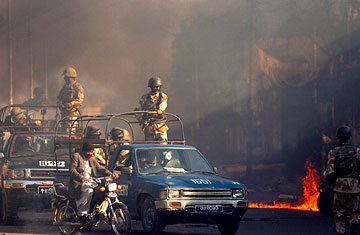
Pakistani soldiers patrol the streets of Karachi the day after the assassination of former Prime Minister Benazir Bhutto, December 28, 2007
Even as Pakistan buries assassinated former Prime Minister Benazir Bhutto today, mourning Pakistanis are beginning to think about what comes next for their beleaguered nation. Bhutto supporters vented their anger late into Thursday night, burning shops, police stations and buses in Lahore, Karachi and Rawalpindi, the site of yesterday's suicide attack. Rioting continued on Friday. "It has released bottled-up national energies," says Lieutenant General Hameed Gul, the former director general of Pakistan's intelligence organization, Inter Services Intelligence (ISI). "[The assassination] is going to really excite the people, bring them out. Which direction this energy takes, that's the question."
Many leading Pakistanis believe that the only way to head off further civil unrest is to form a broad-based coalition government — what Gul calls "a national government of consensus" — to tackle the extremist forces suspected in yesterday's attack. I.A. Rehman, the director of the Human Rights Commission of Pakistan agrees: "Pakistan's survival depends on the earliest possible transition to democracy and the formation of an all-party national government." Elections are scheduled for Jan. 8, although so far there has been no official word on the vote's status in the wake of Bhutto's assassination, and some speculate they are likely to be delayed. Opposition leader Nawaz Sharif announced Thursday that his party would boycott the elections, threatening the vote's legitimacy if it were to go forward. But if the vote is delayed and unrest continues, Rehman fears there is a real chance that regional divisions could lead to the breakup of the country. Karachi, the site of some of the worst violence, is Pakistan's biggest city, the capital of the southern province of Sindh and the traditional power base for Bhutto's family. (Her father, former Prime Minister Zulfikar Ali, also died in Rawalpindi, executed by Pakistan's then-leader General Zia Ul-Haq). Many in Sindh resent the government in Islamabad. "The provinces are pulling in different directions already and if all these forces are not kept in check then there is a serious threat to the integrity of Pakistan," says Rehman.
Even if elections go ahead, there's still the problem of whether a new parliament could work with embattled President Pervez Musharraf. The opposition parties likely to do well, including Bhutto's Pakistan People's Party (PPP) and Sharif's Pakistani Muslim League, are insisting that he quit. In the wake of the assassination, Sharif called Musharraf "the cause of all our problems" and demanded that he resign immediately. The President is deeply unpopular after a series of moves that opponents say was intended to prolong his hold on power, culminating in his declaration of a state of emergency on Nov. 3. While Musharraf, who lifted the state of emergency earlier this month, has called for calm and three days of mourning in the wake of the assassination, "He is really the red rag to the bull at the moment," says Gul. "The nation is enraged."
Although there is no evidence linking Pakistan's security forces to Bhutto's assassination, Gul, like Sharif and many other Pakistanis, says Musharraf is to blame for her death. He argues that the government should have provided better security to Bhutto, who had been targeted by a suicide bomber the day she returned to Pakistan from self-imposed exile two months ago. That blast killed some 140 people. "Why didn't the security forces have jamming devices [to stop the bomb exploding]?" asks Gul of Thursday's attack. "How is it possible that a man with a weapon could enter the arena and get so close to her? It's a comprehensive failure of the government."
Rana Sana Ullah Khan, a member of the provincial assembly in Punjab who is fiercely opposed to Musharraf's rule, agrees. Khan believes a democratically elected unity government could better deal with the Islamic extremists who have unleashed a wave of attacks and suicide bombings in Pakistan's cities over the past year than could Musharraf, a military man who seized power in a bloodless coup in 1999. "With force, with helicopter gunships, with bombardments, with army actions, you can't solve this problem," he says. "But the generals only know how to use force." A unity government, Khan argues, would be better able to negotiate "with these forces in opposition to Pakistan" and end the bloodshed.
Perhaps. But following the assassination, Pakistan's already clouded future is even more uncertain. Syed Kamran Zafar, an Islamabad-based PPP official, says supporters of the charismatic Bhutto are too shocked to think about what happens next. "We are not yet in a position to talk coherently," he says, before breaking down in tears. "We are in shock and don't know what the future holds. Only that it will be without Benazir."
